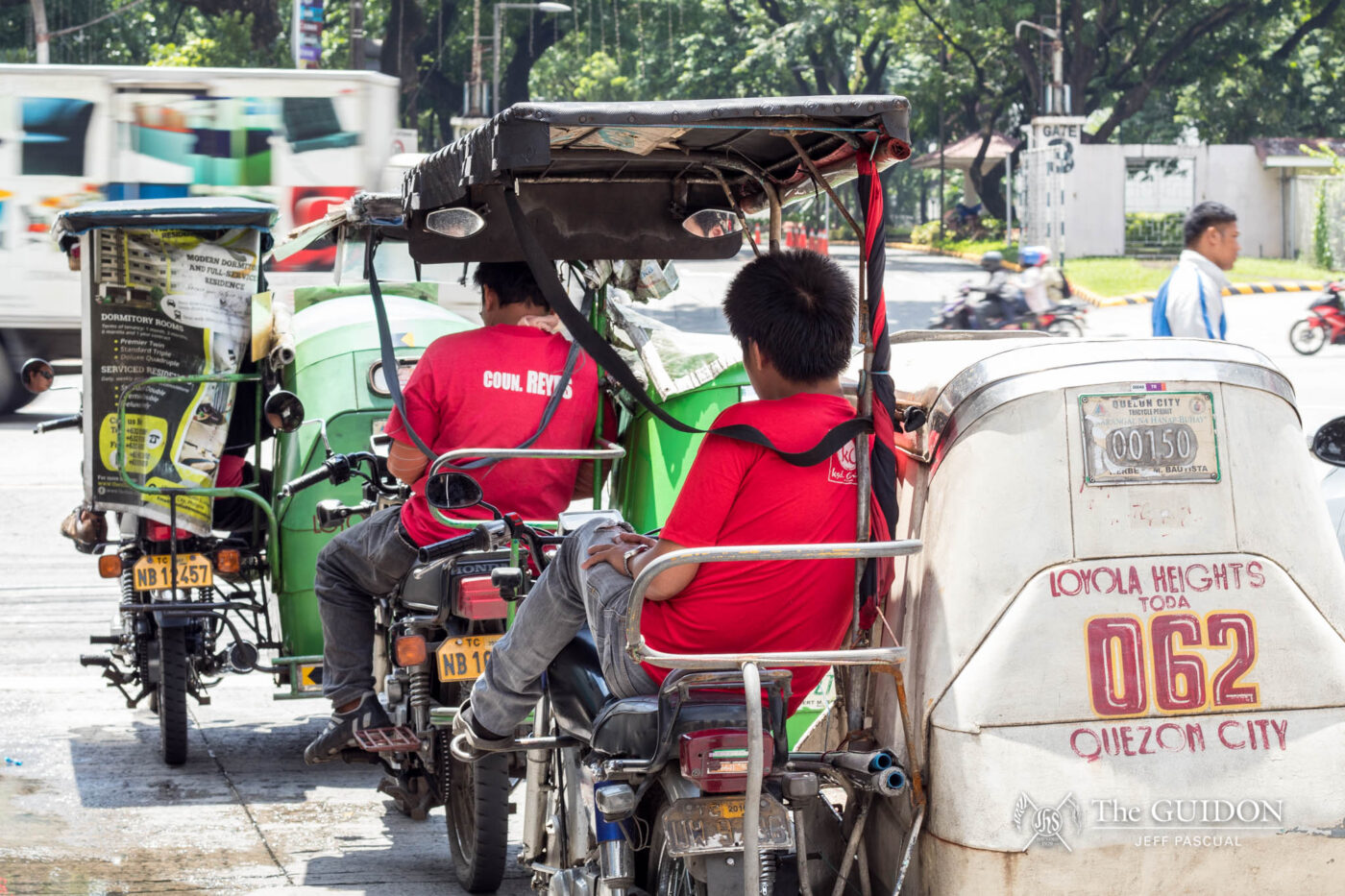IN RESPONSE to a series of transportation-related issues, the Campus Safety and Mobility Office (CSMO), along with the Office for Student Services (OSS), is set to implement various initiatives aiming to improving traffic and mobility on campus.
This is in light of the recent tricycle ban on June 26 where tricycles were prohibited from passing along Katipunan Avenue. The ban was lifted the following day.
The initiatives also come in response to the concerns raised in a meeting on July 7 among representatives of the CSMO, OSS, the Sanggunian, and Katipunan Tricycle Operators and Drivers Association (TODA) groups regarding tricycle fares, driver and passenger violations, and road safety.
Reinforcing policies
Following the lift of the one-day ban on June 26, tricycles were only allowed to pass by Katipunan, provided they use the rightmost lane of the highway. During the ban, drivers were also restricted from passing through Fabian dela Rosa street unless they were entering the Ateneo campus.
CSMO Director Marcelino Mendoza explained that the new tricycle routes were discussed in a public hearing by the Committee on Transportation on August 24, which proposed a new ordinance updating the tricycle routes in Katipunan.
Present in the meeting were representatives from the Katipunan TODAs, Katipunan barangay residents, Metro Ma n i la Development Authority (MMDA), Quezon City Department of Order and Safety (QCDPOS), Ateneo CSMO, and Miriam College.
Mendoza explained that the MMDA agreed to allowing tricycles to cross Katipunan from Fabian dela Rosa street. For tricycles going southbound, the permitted route was to drive along outermost lane of Katipunan from Ateneo Gate 3.5, to Miriam College’s main gate, and then cross to B. Gonzales street.
MMDA also suggested that tricycles without passengers, and those coming from Ateneo and Miriam with passengers, may just cross B. Gonzales street instead of taking a U-turn at the intersection of the C.P. Garcia and Katipunan roads.
However, Loyola Heights Barangay Captain Darwin Hayes said that commuters from barangays Pansol and Loyola Heights who wait along UP Town Center and Santa Maria della Strada church would be inconvenienced if the passage of tricycles were limited in that area.
Mendoza clarified that “after hearing all sides, the committee chair decided that further [studies] be made on the proposed route. Subcommittee hearings will be scheduled this month to finalize the proposal.”
Additionally, the CSMO looked into the other concerns raised in the July 7 meeting, such as the tricycle fare matrix, regulation of proper attire of tricycle drivers entering campus, and cases of overcharging of fares by tricycle drivers.
Mendoza said that the CSMO and the TODAs will be strict in ensuring that each tricycle in Katipunan has a copy of the fare matrix in the vehicle. They will also regulate the wearing of the TODA-prescribed red polo shirt for tricycle drivers.
As for overcharging incidents, he encouraged passengers to immediately report such cases to the CSMO.
Meanwhile, OSS Director Cholo Mallillin, being one of the signatories on the fare matrix, said that the OSS is considering an appeal of the tricycle drivers to raise the tricycle fare, which was also discussed in the July 7 meeting.
According to the drivers, the appeal comes in light of the fare hike for jeepneys, as well as external factors such as the price increase of commodities as an effect of the Tax Reform for Acceleration and Inclusion (TRAIN) Law.
Also tackled in the August 24 meeting was a proposed ordinance to give tricycle fares a Php 1 increase. According to Mendoza, the CSMO will set a meeting with the TODAs to adjust the tricycle matrix once the ordinance is approved.
Another concern brought up in the meeting was the appeal to establish an additional tricycle terminal at Gate 1. However, Mallillin said the administration is unable to grant space for a tricycle terminal at the area.
Improving the situation
Aside from the tricycle-related issues, Mallillin also mentioned that the Loyola Schools (LS) administration is looking forward to improving the transportation situation on and off campus through the Traffic and Mobility Council headed by Assistant to the Associate Dean for Student and Administrative Services (ADSAS) for Campus Events Management, Chris Castillo.
In partnership with the CSMO and the Ateneo Institute of Sustainability, the council will be “strategizing and spearheading LS’ efforts for traffic and mobility.”
“On top of the typical providing [of] transportation options for the general riding public, the [council will look into] the carpool [system], the point-to-point (P2P) bus service, and the possibility of radically decreasing the volume of vehicles in the LS [through a] coding system for students and employees,” Mallillin explained.
Additionally, Mendoza said the CSMO will be “enhancing the existing carpool system in the LS” through Wunder, a carpool service application that allows users with the same routes to share rides through their smartphones. According to him, Ateneo, through the CSMO, is currently in the process of finalizing a memorandum of agreement with Wunder.
Meanwhile, Sanggunian Vice President Niels Nable said his office aims to improve the ex isting carpool program of the Sanggunian in partnership with the Ateneo Department of Student Welfare and Services (DSWS) “in order to cater to a larger student population.” He said that the implementation is targeted for the coming second semester.
“The carpool program of [Sanggunian] via DSWS has [existed] for quite some time now, it’s just that not a lot of people know about it. I think there are several ‘informal’ carpool groups in Ateneo, [like] the Alabang carpool group, and we aim to have partnerships with them,” he explained.
“I think it’s really about marketing the program well to the student body, and making sure that there are incentives for those who will participate,” he added.







